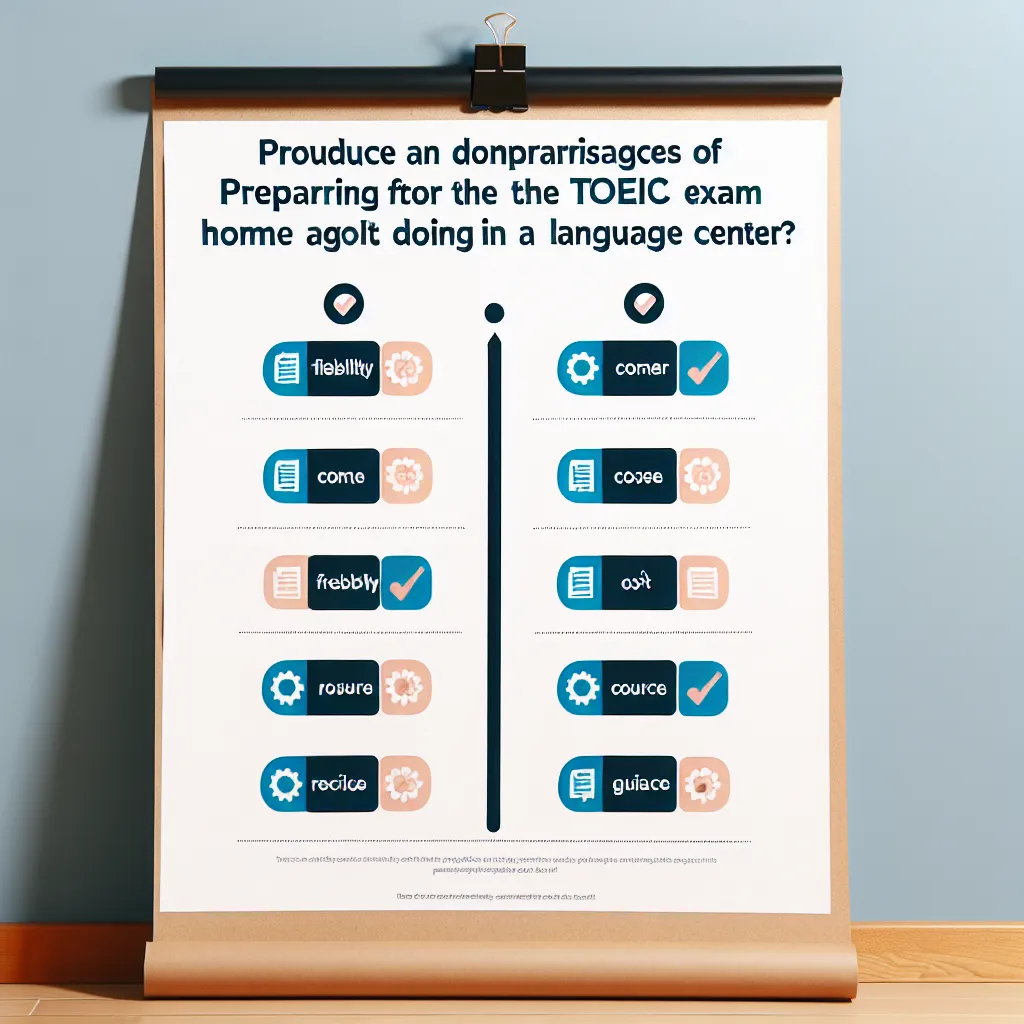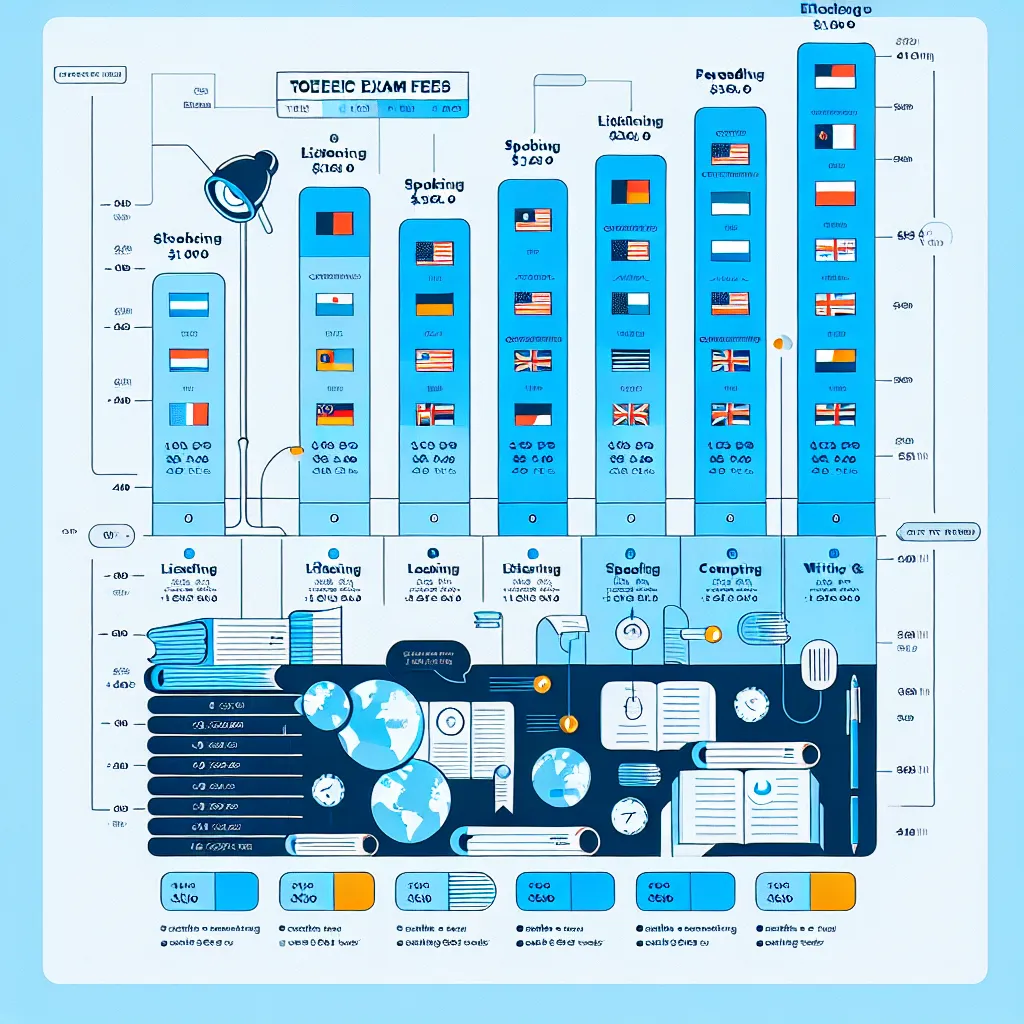Preparing for the TOEIC exam is a crucial step in demonstrating your English proficiency for professional purposes. One of the most common dilemmas faced by test-takers is deciding whether to study at home or in a language center. This comprehensive guide will help you make an informed decision based on your individual needs and circumstances.
Understanding the TOEIC Exam
Before diving into the pros and cons of studying at home versus in a center, it’s essential to understand what the TOEIC exam entails. The Test of English for International Communication (TOEIC) is designed to measure the everyday English skills of people working in an international environment.
Key Components of TOEIC
- Listening Section (45 minutes)
- Reading Section (75 minutes)
- Speaking Section (20 minutes) – optional
- Writing Section (60 minutes) – optional
 TOEIC Exam Components
TOEIC Exam Components
Studying for TOEIC at Home
Advantages of Home Study
- Flexibility: Studying at home allows you to create a schedule that fits your lifestyle and other commitments.
- Comfort: You can study in a familiar environment, which may reduce stress and increase focus.
- Cost-effective: Home study often requires fewer financial resources compared to enrolling in a language center.
- Personalized pace: You can spend more time on areas where you need improvement without feeling rushed.
Challenges of Home Study
- Self-discipline: Without external motivation, it can be challenging to maintain a consistent study routine.
- Limited resources: You may not have access to the same range of materials and technologies available at a language center.
- Lack of immediate feedback: It can be difficult to assess your progress or correct mistakes without expert guidance.
- Isolation: Studying alone may lead to a lack of motivation and missed opportunities for collaborative learning.
Tips for Effective Home Study
- Create a dedicated study space free from distractions.
- Develop a structured study plan with clear goals and deadlines.
- Utilize online resources, including practice tests and interactive exercises.
- Join online TOEIC study groups or forums for support and motivation.
- Regularly assess your progress using official TOEIC practice materials.
Studying for TOEIC in a Language Center
Advantages of Center-Based Study
- Professional guidance: Experienced instructors can provide targeted advice and strategies.
- Structured curriculum: Centers often offer well-designed courses tailored to the TOEIC exam.
- Peer interaction: Studying with others can enhance motivation and provide opportunities for language practice.
- Access to resources: Centers typically offer a wide range of study materials and technologies.
- Mock exams: Many centers provide simulated test environments to familiarize students with exam conditions.
Challenges of Center-Based Study
- Fixed schedules: You may have to adjust your personal schedule to attend classes.
- Higher costs: Enrolling in a language center is generally more expensive than self-study.
- Commuting: Traveling to and from the center can be time-consuming and potentially stressful.
- Pace limitations: The class may move too quickly or slowly for your individual needs.
Maximizing Center-Based Learning
- Actively participate in class discussions and activities.
- Take advantage of any additional resources or support services offered by the center.
- Form study groups with classmates for extra practice outside of class hours.
- Communicate your specific needs and goals to your instructors for personalized guidance.
 TOEIC Study Comparison
TOEIC Study Comparison
Factors to Consider When Choosing
When deciding between home study and center-based learning for TOEIC preparation, consider the following factors:
- Learning style: Do you thrive in structured environments or prefer self-directed learning?
- Time availability: Can you commit to a fixed class schedule, or do you need more flexibility?
- Budget: How much are you willing to invest in your TOEIC preparation?
- Current English level: Do you need significant improvement or just fine-tuning of your skills?
- Motivation: Can you stay disciplined without external accountability?
- Access to resources: Do you have the necessary materials and technology for effective self-study?
Hybrid Approach: Combining Home and Center-Based Study
For many TOEIC test-takers, a combination of home study and center-based learning can provide the best of both worlds. This hybrid approach allows you to:
- Attend classes at a center for structured learning and expert guidance.
- Supplement center-based learning with self-study at home for additional practice.
- Use center resources for mock exams and specialized materials.
- Practice independently using online tools and resources.
- Benefit from peer interaction while also developing self-discipline through individual study.
Conclusion: Making the Right Choice for You
Ultimately, the decision to study for the TOEIC exam at home or in a center depends on your personal circumstances, learning preferences, and goals. Consider your options carefully, and don’t be afraid to experiment with different approaches to find what works best for you.
Remember, regardless of where you choose to study, consistency and dedication are key to success on the TOEIC exam. Set clear goals, create a realistic study plan, and stay committed to your preparation. With the right approach and mindset, you can achieve your desired TOEIC score and open doors to new professional opportunities.
[internal_links]
- TOEIC Exam Format and Structure
- Top TOEIC Study Resources for Self-Learners
- How to Choose the Right TOEIC Preparation Course
- Time Management Tips for TOEIC Success
- Effective Strategies for TOEIC Listening and Reading Sections
[/internal_links]




